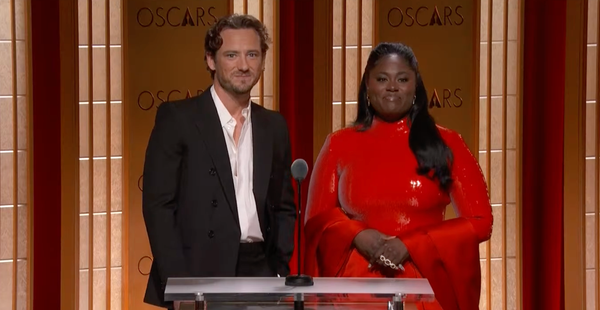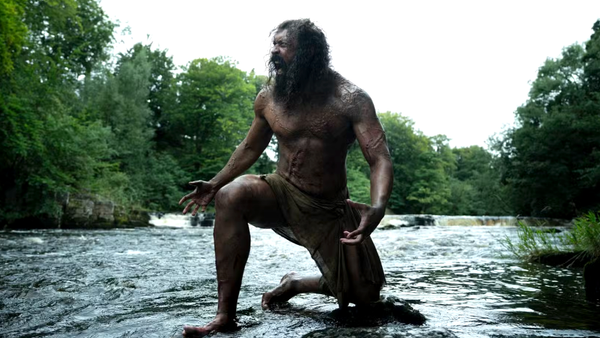Marvel's Secret Invasion Was a $200MM+ Disaster
The Marvel streaming experiment hits a massive speed bump.
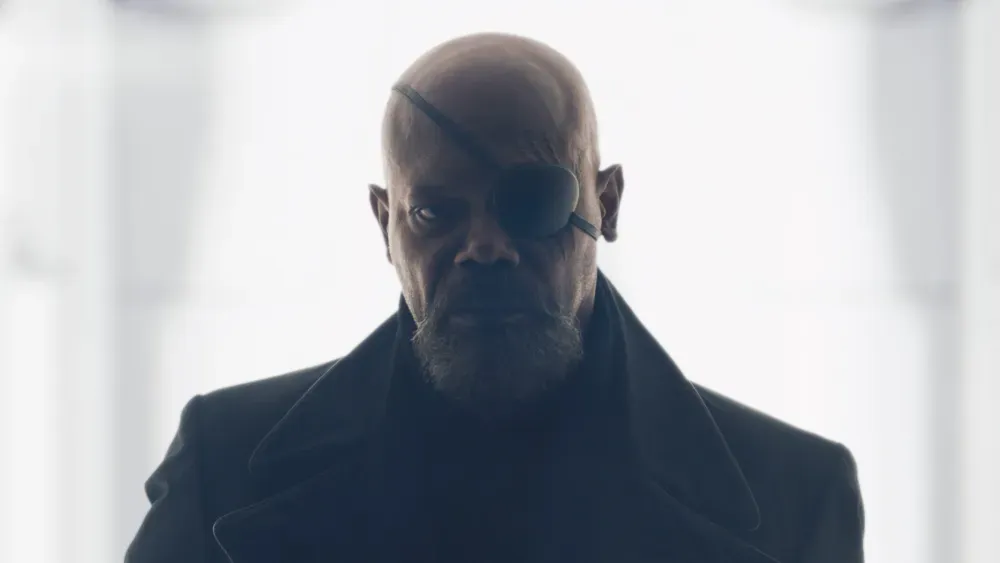
This post will contain spoilers for the entire season of Secret Invasion on Disney+.
I don’t usually write here about the shows I’m covering on Decoding TV but the other day, I saw a post that felt significant:
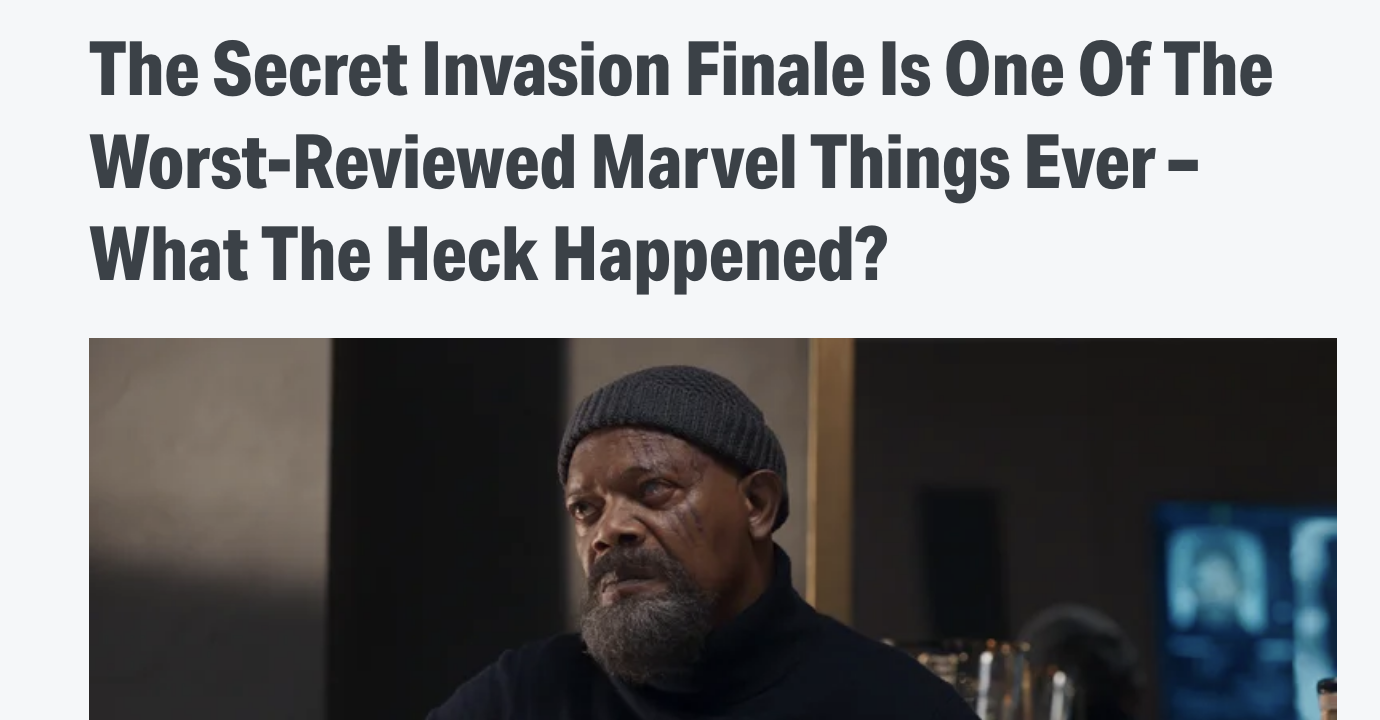
It turns out that Marvel’s Secret Invasion, which just wrapped up a six-episode run on Disney+, is the worst-reviewed piece of content that has ever come out of Marvel. It currently sport a Rotten Tomatoes score of 8% (albeit only with 12 reviews). It was also recently revealed that Secret Invasion’s budget was $212 million. How did we get here?
When Marvel Studios first kicked off its streaming project in January 2021 with WandaVision on Disney+, it felt promising. There’d been previous streaming series with Marvel characters (e.g. Daredevil) and even TV shows that took place in the MCU (e.g. Agents of S.H.I.E.L.D.). But WandaVision was going to be a bit different. It was the first TV series set in the MCU and produced by Marvel Studios. It also served as one of the pillars of Disney’s new streaming service at a time when every major studio felt like it had to build its own bulwark against Netflix.
On a structural level, WandaVision respected the episodic nature of television, with several of its episodes using different aesthetics from specific TV eras. And it seemed as though it would open up the opportunity for Marvel to tell compelling stories about lesser Marvel characters during the time between movies and/or serve as valuable setup for upcoming MCU plotlines.
Two and a half years later it’s safe to say that, in the main, Marvel streaming shows on Disney+ have failed at accomplishing those things. Most of the shows have felt disposable and their relevance to broader MCU storylines has been questionable at best. For example, the TV show Loki largely serves as a massive build-up to the introduction of Kang, only for that character to then be re-introduced again (poorly) in Ant-Man and the Wasp: Quantumania. As another example, the entire series of Falcon and the Winter Soldier basically leaves the status quo unchanged from the ending of Avengers: Endgame. When Captain America: Brave New World comes out in 2024(?), I will be stunned if anything from the TV series is even referenced.
The reason for this is no mystery. In a recent interview with CNBC, Disney head Bob Iger explained what’s going on with Marvel streaming TV:
Marvel is a great example of our focus on streaming content. We ended up taxing our people way beyond their time and their focus, they had not been in the television business at any significant level. Not only did they increase their movie output but they ended up making a number of television series, and frankly, it diluted focus and attention…
It was a stunning admission, as Iger acknowledged that Disney would likely pull back on the scale and frequency of MCU TV show production — a move I definitely support in light of the current quality of offerings. Disney stretched people beyond what they were capable of, and asked people to make TV shows who were not experienced at making TV shows.
The logical end result is a show like Secret Invasion.
The Real Invasion Was The Lore We Ruined Along The Way
In the post-credits scene of Spider-Man: Far From Home, it’s revealed that Nick Fury is actually in space. What is he doing there? Why did he leave Earth in the first place? Potentially compelling questions that might be answered by a Disney+ streaming series! Enter Secret Invasion, which sees Nick Fury (Samuel L. Jackson) returning to Earth in order to confront his past and deal with a rebellion of Skrulls that seek to infiltrate the highest levels of our government and the world order.
Secret Invasion feels listless. A major terrorist attack attempt occurs in a majority of the six episodes but strangely, none of them leave any kind of impression. These Skrull ploys don’t have any build-up and as a result don’t feel like they have any stakes whatsoever. A whole slew of new characters are introduced, many of them played by enormously talented actors (including Academy Award winner Olivia Colman). But the show doesn’t seem to know what to do with any of them as we drift in and out of their plotlines with none of them really landing. Major character deaths are glossed over or barely acknowledged.
Putting aside how (un)compelling Secret Invasion is as a TV show, the film leaves the MCU in a terrible place and is one of those rare shows that retroactively makes previous MCU entries worse. To wit (here come the spoilers):
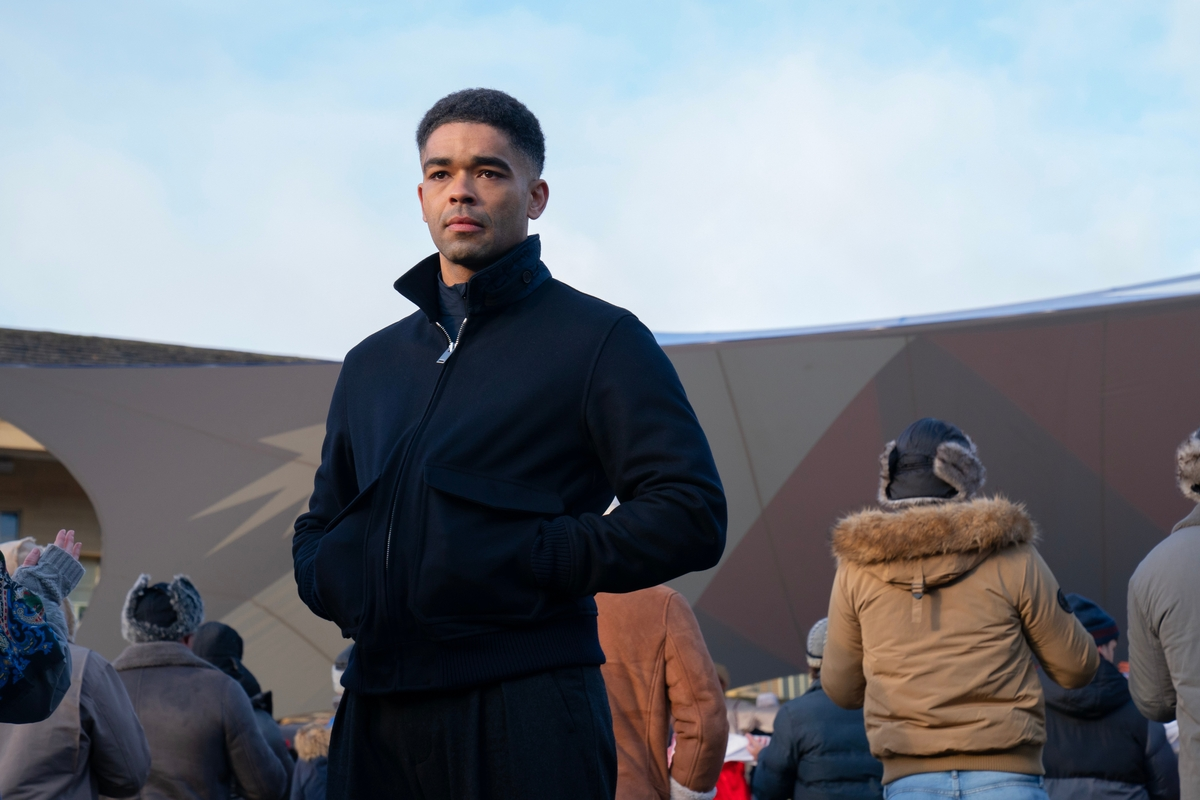
The Skrulls Are Bad Now, Kind Of: One of the best things about 2019’s Captain Marvel was that it turned the idea of green shape-shifting aliens on its head. The audience thinks that the Kree folks, like the one Jude Law played, are the good guys, while the green aliens like Ben Mendelsohn’s Talos are the baddies. But in fact, it’s the opposite! The Kree actually turned out to be the oppressors.
Which is why it’s such a bummer that Secret Invasion reverts us back to the point where it turns out that a bunch of Skrulls were actually evil double agents who’ve infiltrated our highest levels of government. Not only does it traffic in anti-semitic tropes, but it un-does one of Captain Marvel’s great contributions to the MCU.
Rhodes Was Maybe a Skrull The Whole Time: One of the big reveals of Secret Invasion is that Col. James Rhodes (Don Cheadle) has been a Skrull for an indeterminate amount of time. In a post-show interview, director Ali Selim has claimed he believes that Rhodes has been a Skrull since Captain America: Civil War. This would mean he was a Skrull for all of Avengers: Endgame.
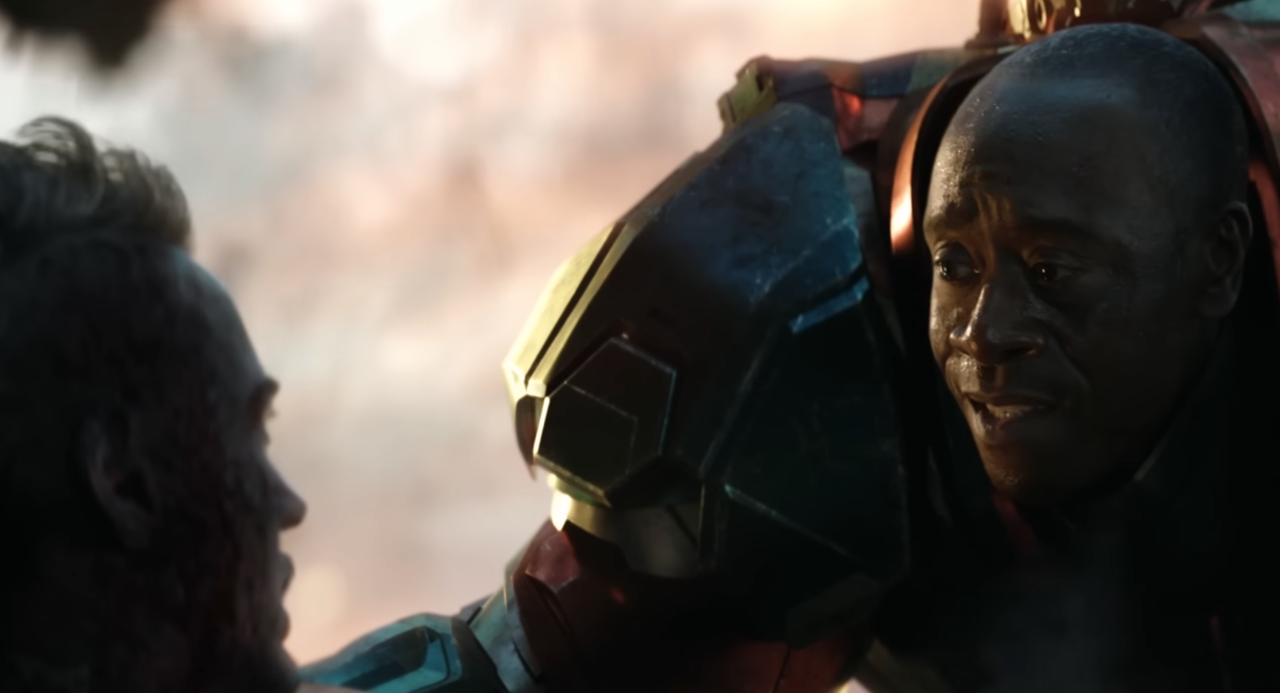
I’m of two minds on this. On the one hand: this is a stunningly silly development. To the extent that the plot of Rhodes had any emotional resonance at all, it was as a long-time friend of Tony Stark’s. If he was actually being replaced by a Skrull (one who we learn virtually nothing about, btw) for the last few years of MCU plot, then it completely undercuts all of his major emotional beats.
On the other hand, Secret Invasion does not explicitly say how long Rhodes has been a Skrull and even Selim seems to acknowledge that the forces that be will leave it up to whoever makes the upcoming MCU film Armor Wars to decide. In other words: Don’t worry too much, I doubt this development will actually have much of an impact.
Nick Fury Just Went Back To His Home Planet: In the finale of Secret Invasion, the Skrull version of Rhodes unsuccessfully attempts to kill President Ritson (Dermot Mulroney). Ritson’s response is to start exterminating anyone even suspected of being a Skrull. For a few moments, Secret Invasion roars to life as we see scenes of various public figures brutally executed. It seems as though we’re setting up for a much more interesting show, one that’s loaded with paranoia and intrigue!
And that’s when the show abruptly ends. Nick Fury returns to space because he’s going to help the Skrulls negotiate a piece with the Kree (a plot development that literally is introduced in the final 5 minutes of the show). Earth is burning but that doesn’t seem to bother Fury very much. He’s got stuff to do.
It’s a baffling decision for a character whose arc for this show was ostensibly supposed to be him coming to terms with the state in which he left Earth in the first place. It’s so thoughtless that it verges on character assassination. But hey, Fury needs to be back in space when The Marvels comes out, presumably, so he definitely can’t stay here.
Those are just a few of the biggest issues off the top of my head. The show has countless more problems, like the fact that Nick Fury barely mourns the death of Talos — a close, longtime friend. Or the fact that it turns out that Nick Fury had a wife this whole time who was a Skrull and we barely understand what their dynamic was. Or the fact that the one moment of actual emotional weight that occurs between the main villain, Gravik, and Fury is undercut by the reveal that G’iah (Emilia Clarke) was impersonating Fury. Or the fact that this is a real screengrab from the big fight in the finale.
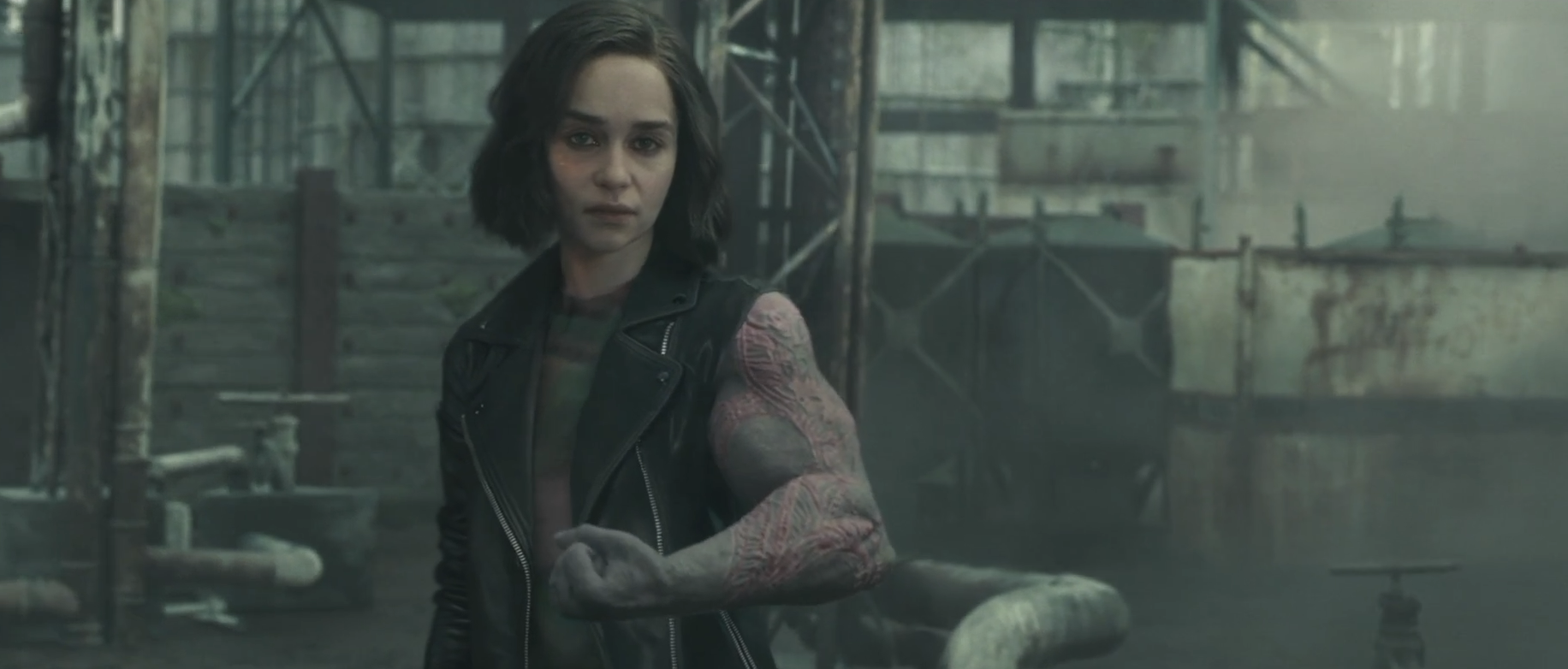
Assuming it’s not delayed, The Marvels is currently on track to be released in November 2023. It promises to tie together the stories of multiple Marvel heroes: Monica Rambeau (first introduced in Captain Marvel and later WandaVision), Kamala Khan (Ms. Marvel) and Carole Danvers. It will also feature Nick Fury and presumably continue the story of Secret Invasion. I have no idea how it will do any or all of those things successfully but if Marvel TV series are to have any kind of creatively interesting future, they need to do a better job of either telling compelling, self-contained stories or doing world-building for the MCU that doesn’t thoughtlessly tear down what already came before.
If you enjoyed this post, please consider sharing it. And check out my conversation with Patrick Klepek about the finale on the Decoding TV podcast, as well as on YouTube below.
